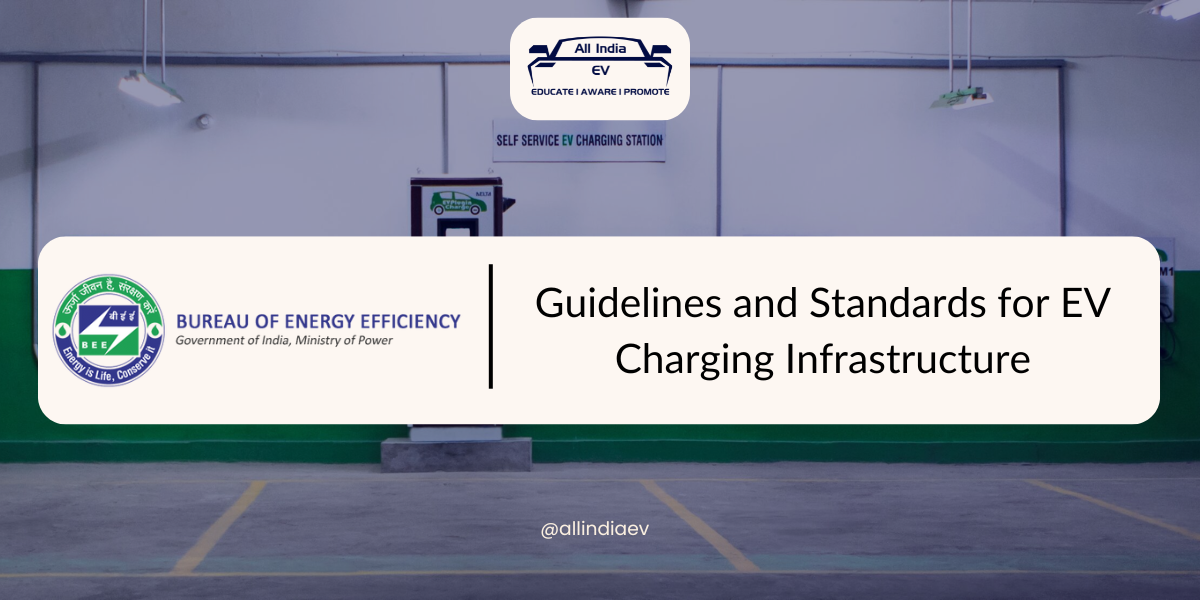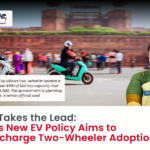
Revised Guidelines and Standards for EV Charging Infrastructure: Key Highlights
The Bureau of Energy Efficiency (BEE) has issued a draft of the “Revised Guidelines & Standards for EV Charging Infrastructure” on June 28, 2024, inviting comments from stakeholders. These guidelines aim to accelerate the adoption of electric vehicles (EVs) in India by ensuring a safe, reliable, and accessible EV charging infrastructure. Here are ten key highlights from the document on Revised EV Charging Guidelines, along with an overview of the Indian EV charging network as of March 31, 2024.
- Revised Guidelines and Standards for EV Charging Infrastructure: Key Highlights
- Comprehensive Applicability
- Enhanced Objectives
- Timelines for Electricity Connections
- Open Access and Customer-Friendly Procedures
- Safety and Operational Standards
- Tariff and Cost Structure
- Public EV Charging Infrastructure
- Provisions for Residential and Community Charging
- Workplace and E-Bus Depot Charging
- Implementation and Monitoring
- Indian EV Charging Network as of March 31, 2024
Comprehensive Applicability
The guidelines are designed to cover a wide range of locations:
Private Spaces: Owners/operators of EV charging infrastructure installed in privately owned parking spaces.
Semi-Restricted Areas: Locations like office buildings, educational institutions, hospitals, and group housing societies.
Public Places: Commercial complexes, railway stations, petrol pumps, airports, metro stations, shopping malls, municipal parking lots, and along highways and expressways.
Enhanced Objectives
The guidelines set forth four primary objectives:
Faster EV Adoption: Ensuring the availability of safe, reliable, and accessible charging infrastructure.
Rational Service Charges: Providing rationality in service charges levied by charging station operators.
Proactive Infrastructure Support: Supporting the creation of a robust EV charging network.
Electrical Distribution System Preparedness: Ensuring the electrical distribution system can handle the load from EV charging infrastructure.
Timelines for Electricity Connections
To expedite the establishment of EV charging stations, the guidelines specify the following timelines for providing electricity connections:
Metropolitan Areas: Within three days of application.
Other Municipal Areas: Within seven days of application.
Rural Areas: Within fifteen days of application.
Hilly Rural Areas: Within thirty days, with a possible ninety-day extension for new sub-stations.
Open Access and Customer-Friendly Procedures
DISCOMs are required to create a customer-friendly online single-window clearance system to streamline the process of obtaining electricity connections. This includes a standard operating procedure and a standardized application form to expedite approvals.
Safety and Operational Standards
EV charging stations must meet stringent safety and operational standards:
Safety Requirements: Proper cabling, fire protection equipment, covered spaces for EVSE, and compliance with Central Electricity Authority regulations.
Operational Standards: Adequate civil and lighting works, demarcated parking spaces, trained personnel, automated billing systems, and real-time data exchange capabilities.
Tariff and Cost Structure
The guidelines propose a single-part tariff for electricity supply to EV charging stations, capped at the “Average Cost of Supply” until March 31, 2026:
Differential Tariffs: Lower rates during solar hours (9:00 AM to 4:00 PM) and higher rates during non-solar hours.
Separate Metering: Mandatory separate metering arrangements for EV charging stations.
Public EV Charging Infrastructure
Public charging stations are required to comply with Indian Standards and must ideally have a capacity of 7.4 kW:
Protocols and Features: Adoption of open charge point protocols, features for prepaid/postpaid service charges, online booking options, and amenities like washrooms and waiting areas for larger stations.
Provisions for Residential and Community Charging
Residential and community charging provisions include:
Residential Charging: Private EV owners can use existing connections or apply for additional loads if required.
Community Charging: Group housing societies must allocate at least 10% of their common parking capacity for community EV chargers, which should be accessible to visitors.
Workplace and E-Bus Depot Charging
Workplaces and e-bus depots have specific provisions:
Workplace Charging: Offices can set up EV chargers using existing connections and apply for enhanced loads if needed.
E-Bus Depot Charging: E-bus depots can obtain electricity through open access within 15 days of application and must install high-capacity chargers for heavy-duty EVs.
Implementation and Monitoring
The Bureau of Energy Efficiency (BEE) will act as the central nodal agency to monitor the implementation of these guidelines:
State Nodal Agencies: Each state will have a designated nodal agency to facilitate the establishment of EV charging infrastructure.
Steering Committee: A committee under the Ministry of Power will review progress quarterly, ensuring compliance and addressing any issues.
Indian EV Charging Network as of March 31, 2024
As of March 31, 2024, India has made significant strides in expanding its EV charging network:
Total Charging Stations: India has over 15,000 public EV charging stations.
Major Urban Areas: Metropolitan cities like Delhi, Mumbai, Bengaluru, and Chennai have robust charging infrastructure with over 3,000 stations collectively.
Highway Corridors: Key highways and expressways are equipped with charging stations at intervals of 50-60 km to ensure seamless intercity travel.
Policy Support: Government initiatives and subsidies have played a crucial role in enhancing the network, with several state-specific policies encouraging private and public sector participation.
The revised guidelines aim to build on this progress, ensuring that India continues to lead in the adoption of electric mobility, reducing its carbon footprint, and promoting sustainable transportation solutions. Stakeholders are encouraged to review these guidelines and provide feedback to help shape a more efficient and effective EV charging infrastructure in the country.




